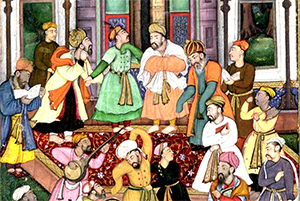|
Petama Topic January Journeys and a New Page Turned 1 from Hazrat Inayat Khan: 'Confessions and Revelations' |
But the most amazing part of the proceedings came when the assembly was about to disperse. For one of the dervishes arose and, while announcing Bhundara or dinner, addressed them in the following terms, ‘O Kings of Kings! O Emperors of Emperors!’ This amused me greatly at the time, while I regarded their outward appearance. My first thought made them merely kings of imagination, without throne or crown, treasury, courtiers, or dominions - those natural possessions and temporal powers of kingship. But the more I brooded upon the matter, the more I questioned whether environment or imagination made a king. The answer came at last: the king is never conscious of his kingship and all its attributes of luxury and might, unless his imagination is reflected in them and thus proves his true sovereignty. This shows how real our surroundings seem to us, and yet how dead they are in the absence of imagination. And it also reveals how fleeting time and the changes of matter make all the kings of the earth but transitory kings, ruling over transitory kingdoms; this is because of their dependence upon their environment instead of their imagination. But the kingship of the dervish, independent of all external influences, based purely on his mental perception and strengthened by the forces of his will, is much truer and at once unlimited and everlasting. Yet in the materialistic view his kingdom would appear as nothing, while in the Inner conception it is an immortal and exquisite realm of joy. Verily, they are the possessors of the kingdom of God, and all His seen and unseen treasure is in their own possession, since they have lost themselves in Allah and are purified from all illusive deceptions. It is by them that you obtain rain; it is by them that you receive your subsistence', says the Qur'an. While I was roaming through the forest, a thorn pricked my bare foot and cried, 'Ah, you have crushed me.' I felt sorry and I asked its forgiveness.
A wasp flying in the air stung my arm and cried,
My foot slipped and I fell in a pool of muddy water. The water cried, 'Ah, you have disturbed me'. I felt sorry and I asked its forgiveness.
I absently happened to touch a burning fire, and the fire cried, 'Ah, you have extinguished me.' I felt sorry and I asked its forgiveness.
I asked my gentle self, 'Have you received any harm?' 'Be thankful,' said she, 'that is was not worse.'
Vadan - Alankaras (these E-book are free of all charge - use their treasures well!) |
|

